The Augusta Heritage Center of Davis & Elkins College in Elkins, West Virginia
After a two-year pandemic hiatus, the Augusta Heritage Center will again host in-person blues workshops taught by expert instructors, most of which are featured in this website (see the bios links). The 2022 Augusta Blues Week promises to be another especially exciting event of learning and collaboration, joyous jamming and kindred-spirit fellowship. Blues Week is again coordinated jointly by longtime hosts Joan Fenton and Phil Wiggins. Not only will students have the opportunity to interact and learn from professional blues musicians, but this year there will be a special tribute to “The Three Johns”, the acoustic blues luminaries John Cephas, John Jackson and John Dee Holeman – all former teachers at Augusta Blues Week. The program to honor the Three Johns includes musicians and Augusta instructors, each of whom was close to the respective Johns. They will relate anecdotes and perform the music taught to them by the Three Johns.
Registration is now Open To register for the summer program, click here: https://augustaartsandculture.org . We look forward to seeing you there!
About Augusta Blues Week
Established in 1973, The Augusta Heritage Center of Davis & Elkins College facilitates cultural education through immersive and experiential workshops in music, craft, dance, foodways, and folklore. Augusta’s dances, concerts, festivals, film screenings, cultural sessions, and other public events connect communities of learners and enthusiasts with master artists and culture-bearers year-round. Through these many activities, Augusta strives to highlight and elevate traditional folkways, particularly those of the underserved communities of Appalachia and beyond.
Now in its 48th year, Augusta currently offers a wide variety of online opportunities in addition to its robust live offerings. Seasonal memberships to online educational packages and virtual access to materials such as the Augusta Archives and recordings from the Augusta Label are available through our website. By blending online and live experiences, we create tangible connections to history and living traditions.
Throughout its history, Augusta has nurtured a community of artists who have shared their talents and values in a cooperative, supportive environment. Many of today’s cultural ambassadors received their early lessons by participating in Augusta’s heritage workshops. Augusta was recognized by the Folk Alliance International with a Lifetime Achievement Award in 2013, received the West Virginia Governor’s Award for the Arts in 2016, was named “Bluegrass Event of the Year” in 2020 by the International Bluegrass Music Association, and received the Vandalia Award from the West Virginia Department of Arts, Culture and History in 2021
Harmonica
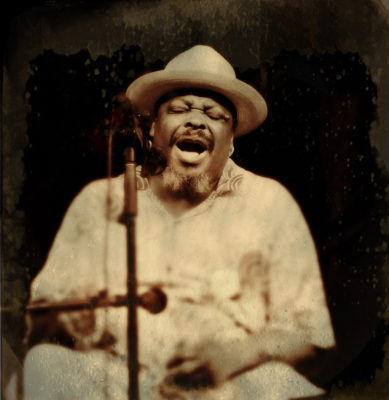
Phil Wiggins (Program Coordinator):Fundamentals of Blues Harmonica | Beginning (+) | Week 3 (Periods 2 and 3)
This class is for beginners and people that need to bone up. We will start with rhythm and accompaniment harmonica, move on to single note with a focus on good clear tone, and then learn two simple melodies with blues cliché phrases that are useful in several different songs. We will incorporate cupping or hand technique and as a final goal, learn to bend notes and control them and using bent notes in melody lines. Folks will need Townhall diatonic Harmonicas in the key of A C, D, F and G. We will be doing some singing and you will be able to join in on some of the jam sessions. Looking forward to having a fun time!
https://www.thecountryblues.com/artist-reviews/phil-wiggins/
Joe Filisko | Intermediate/Advanced Blues Harmonica
Joe will be teaching more from the traditional blues big sound & tone approach to playing the diatonic harmonica. Bring your A, Bb, C, D and G harps and prepare to be introduced to more essential blues harp repertoire.
Joe Filisko & Eric Noden | In the Style of Sonny Terry and Brownie McGhee (Harmonica & Guitar) | All levels | Week 3 (Period 2)
In this workshop Joe Filisko and Eric Noden will dig into the style of legendary acoustic blues duo Sonny Terry & Brownie McGhee. They’ll look at what made the duo’s combined guitar and harmonica approach so powerful and unique. They’ll teach 2 original songs created in this style. Joe and Eric will break down the guitar and harmonica parts separately and then work on bringing it all together with the class.
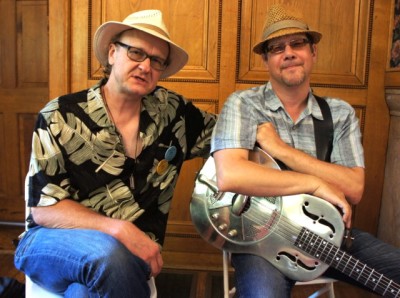
https://www.thecountryblues.com/artist-reviews/joe-filisko-and-eric-noden/
Andrew Alli : Song Repertoire for Harp: Obscure tunes to diversify your playing | Intermediate/Advanced | Week 3 (Period 2)
In this class, we will explore relatively less played songs that deserve more attention. Multiple harp keys recommended. Players of all levels are welcome.
Andrew Alli : Classic Harp Tips and Tricks | Intermediate | Week 3 (Period 1)

Andrew will pass on some classic tips and tricks that he learned along the way. Key of A harp needed. Players of all levels will get something from this class.
https://www.thecountryblues.com/artist-reviews/andrew-alli/
Vocals
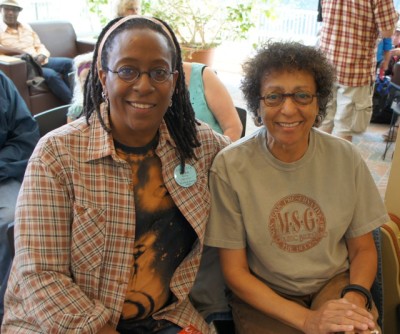
Resa Gibbs: Field Hollers, Work Songs and Spirituals, Part 1 | Intermediate/ Advanced | Week 3 (Period 2) and Part 2 | Intermediate/ Advanced | Week 3 (Period 3)
The classes will focus on a selection of field hollers, African American work songs and spirituals in oral traditions, call/response, rhythms, melody and harmonies, mainly singing in community. Students can attend either or both periods of this class.
Guitar
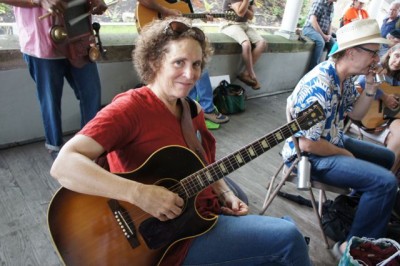
Joan Fenton (Program Coordinator) : Blues Guitar | Beginning | Week 3 (Periods 1 and 3)
Students will learn 2-3 finger-style blues songs, with a focus on different songs and keys from the morning class as well as different techniques and runs. The class will complement the morning class, not duplicate it. Students will first learn songs by ear, with handouts available after we will learn how to learn songs without using tab. Requirements: Students are expected to know the basic chords in first position, A, B7, C, D, E, F and G. and be able to change chords, so that they are ready to learn songs. We will also be using a version of the A chord with the first finger barring the bottom 4 strings on the 2nd fret and the pinky on the 5th fret first string.
Valerie Turner : Country Blues Fingerpicking for Beginners | Beginning | Week 3 (Period 1)
n this workshop, we will explore fingerpicking for Country Blues guitar with a focus on the alternating bass technique through daily right hand exercises reinforced by easy repertoire across a variety of keys. This foundation is critical in order to play the music of early Country Blues masters such as Mississippi John Hurt, Memphis Minnie, and Elizabeth Cotten – just to name a few! Participants will learn by ear, and the class will move at an easy pace. Audio and video recordings are encouraged – with the caveat that such recordings be made for personal use only and do not appear on social media such as YouTube.
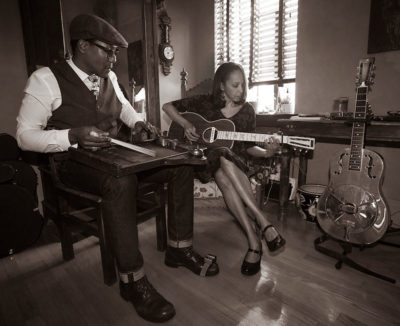
Valerie Turner : Songs from the Repertoire of John Cephas | Intermediate/Advanced | Week 3 (Period 2)
The Piedmont style of fingerpicking is characterized by an alternating bass which is played by the thumb, while other fingers on the picking hand simultaneously play a syncopated melody. The result is a full sound that often feels like two guitars are being played at once. This style was beautifully executed by John Cephas and this workshop will explore intermediate arrangements of songs from his vast repertoire. In the context of these arrangements, we will focus on strengthening thumb/finger independence in the Piedmont style of fingerpicking across a variety of keys. Master this technique and you’ll be an entire band all by yourself! This workshop will move at a medium pace with a goal of covering one new song each day and material will be taught by ear. Participants should already have some experience playing guitar and be able to switch easily between all major chords while keeping time. Audio and video recordings are encouraged – with the caveat that such recordings be made for personal use only and do not appear on social media such as YouTube.
https://www.thecountryblues.com/artist-reviews/valerie-ben-turner-piedmont-bluz/
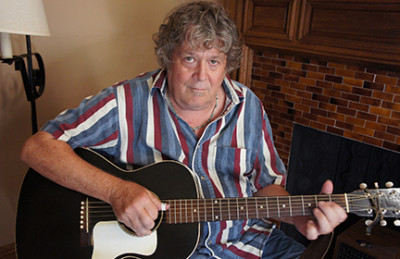
Lightnin’ Wells : Piedmont Blues Guitar | Intermediate/Advanced | Week 3 (Period 1)
We will explore tunes and guitar styles of east coast blues from the 1920s/1930s. Tunes will be in standard tuning in the keys of A, E, C, G, and drop D from such pre-war blues artists as Blind Boy Fuller, Curley Weaver, Blind Blake and William Moore. Students should have some finger-picking skills.
Lightnin’ Wells : Slide/ Bottleneck Guitar | Intermediate/ Advanced | Week 3 (Period 3)
During this class we will explore pre-war blues and gospel songs featuring the slide or bottleneck guitar stylings in open D and G tunings. Songs presented will feature ones recorded by bluesmen Robert Johnson, Muddy Waters, Blind Willie McTell and Rev. Edward W. Clayborn. All students should bring a metal or glass slide and have some knowledge of fingerpicking.
https://www.thecountryblues.com/artist-reviews/lightning-wells/
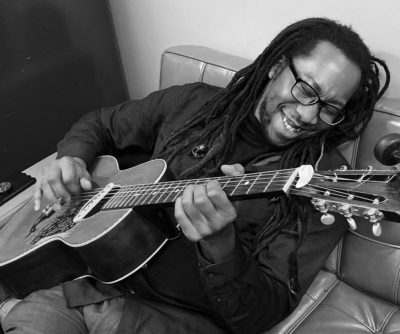
Hubby Jenkins: Blind Willie Johnson | Beginning/Intermediate | Week 3 (Period 1)
Seminal gospel blues artist Blind Willie Johnson left behind records whose impact and influence are immeasurable. In this class, we will break down his slide techniques and some of his most iconic songs.
Hubby Jenkins: Bahamian Guitar: Music & Style of Joseph Spence | Intermediate/Advanced | Week 3 (Period 2)
The Bahamian guitarist Joseph Spence developed a unique way of playing gospel as well as standards. Join Hubby as we delve into the percussive and improvisational nature of his music by breaking down the building blocks of his style.
The multi-instrumentalist Hubbie Jenkins won a Grammy with the Carolina Chocolate Drops and since then has made a name for himself as one of the rising stars in the acoustic blues.
https://www.thecountryblues.com/artist-reviews/hubby-jenkins/
Frank Fotusky : Blues Archetypes | Beginning/Intermediate | Week 3 (Period 1)
This workshop will explore techniques, grooves and runs in different keys using archetypal songs and how they’re applied throughout the Blues canon. The focus will be on the keys of G, C, D, E, & A with songs from Julius Daniels, Mississippi John Hurt, Robert Johnson, Blind Blake and more. Notepad and recorder recommended.
Frank Fotusky : Foundational Guitar Techniques | Beginning/Intermediate | Week 3 (Period 2)
This workshop will focus on often overlooked fundamentals. Addressing these issues will help build a strong foundation on the guitar. Topics will include Left/Right Hand positions; holding the guitar to get the best tone and dynamics; breakdown of fundamental chord shapes and applying them across the fretboard; fingerpicking approaches to build independence between thumb and fingers; back picking upstrokes with thumb. Notepad and recorder recommended.
https://www.thecountryblues.com/artist-reviews/frank-fotusky/
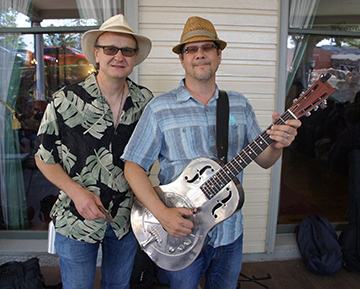
Eric Noden: Big Joe Williams Blues Guitar | Beginning/Intermediate | Week 3 (Period 3)
In this workshop Eric digs deep into the style of Mississippi bluesman Big Joe Williams. Big Joe played guitar with a funky and unique approach using open G tuning capoed at the 2nd fret. He doubled some of strings on his guitar to create a 9-string instrument! His driving rhythm and pentatonic based riffs are part of the Mississippi blues tradition that can also be heard in the music of John Lee Hooker and R.L. Burnside. For this class Eric will break down Big Joe’s classic Baby Please Don’t Go as well some of his own material in this style.
Joe Filisko & Eric Noden | In the Style of Sonny Terry and Brownie McGhee (Harmonica & Guitar) | All levels | Week 3 (Period 2)
In this workshop Joe Filisko and Eric Noden will dig into the style of legendary acoustic blues duo Sonny Terry & Brownie McGhee. They’ll look at what made the duo’s combined guitar and harmonica approach so powerful and unique. They’ll teach 2 original songs created in this style. Joe and Eric will break down the guitar and harmonica parts separately and then work on bringing it all together with the class.
https://www.thecountryblues.com/artist-reviews/joe-filisko-and-eric-noden/
Piano
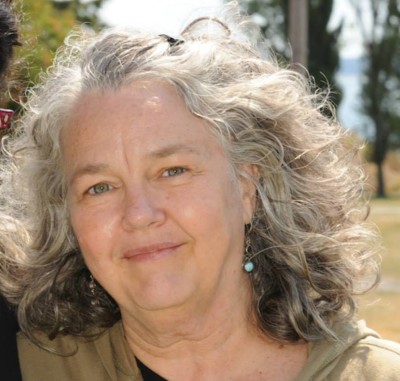
Judy LaPrade : Getting Started on Blues Piano, Parts 1 & 2 | Beginning | Week 3 (Periods 1 & 2)
Participants should plan to attend both Part 1 and Part 2 of this workshop. This will be a piano program on acoustic traditional blues songs, including those not in the usual 12-bar form. The classes are designed for both true beginners to piano players who read music and want to learn to play blues piano by ear. Participants will learn completely by ear in this program, with the use of simple chord charts and lyric sheets. The class will start with the basic 8- and 12-bar blues forms in the key of C and build left- and right-hand skills note by note. Each participant progresses at their own pace, from single notes with each hand to simple blues chords and patterns. With the right hand, participants will pick out melodies by ear and riff on the blues scale and chords. The left hand is all about playing bass lines, from single notes to simple versions of walking bass, rhumbas, shuffles, and others.
Bob Thompson: Blues Piano | Advanced | Week 3 (Period 1)
We will quickly review the material in the intermediate level and add the 8 bar, and the 16 bar blues. We will learn and play more advanced blues chord voicings. We will also study variations of the 8, 12, and 16 bar blues. Finally, we will study a melodic approach to the blues, and how to create a blues solo.
Bob Thompson: Blues Piano | Intermediate | Week 3 (Period 2)
We will learn, and play left hand bass patterns, and basic blues chord voicings. We will apply these to the basic 12 bar blues. We’ll also learn blues scale variations and learn
to play blues rhythms.
Bob Thompson: Great Pianists of the Swing Era | All levels | Week 1 (Period 3)
A look at the styles and repertoire of some of the great swing era pianists including Fats Waller, James P Johnson, Earl “Fatha” Hines, Nat King Cole, Count Basie, Duke Ellington, Teddy Wilson, Dick Hyman, Mary Lou Williams.
Bob Thompson: Swing Piano Techniques: Basic swing rhythms and chord voicings | Beginning/Intermediate (Advanced students will also receive instruction) | Week 1 (Period 1)
We will learn and play standard chord progressions including basic 12-bar blues progressions, 8-bar blues progressions and “rhythm” chord progressions (based on George Gershwin’s I Got Rhythm). We will also learn and play a few standard swing tunes.
Sunpie Barnes: Blues Piano 1 | Intermediate | Week 3 (Period 1) and Blues Piano 2 | Advanced | Week 3 (Period 2)
I will be teaching intermediate/advanced blues piano with an emphasis on walking blues, Louisiana Creole, boogie woogie and rhumba patterns. You can take either or both sections of this class.